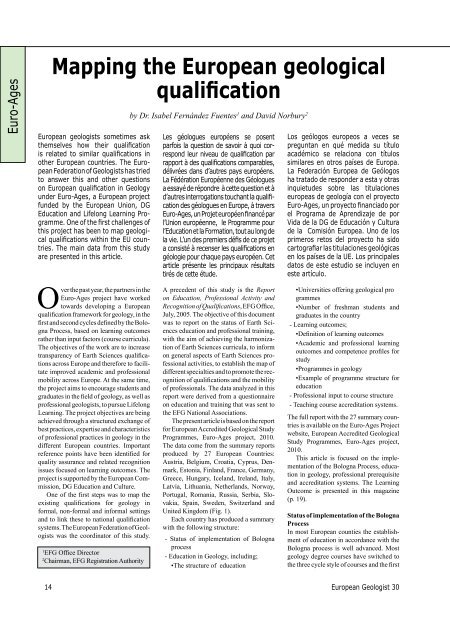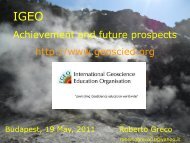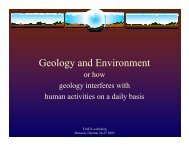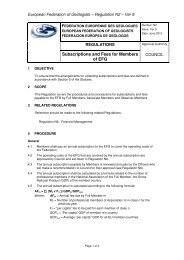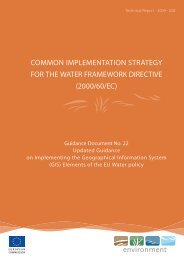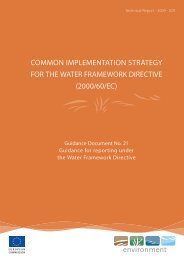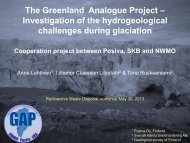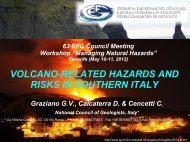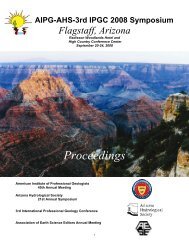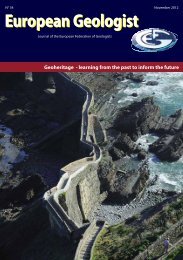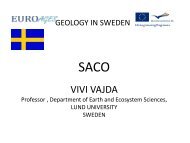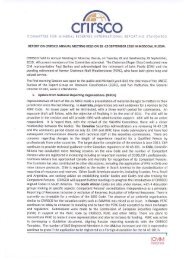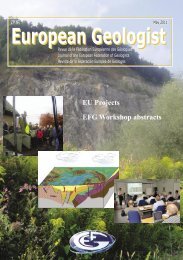EGM 30 download.pdf - European Federation of Geologists
EGM 30 download.pdf - European Federation of Geologists
EGM 30 download.pdf - European Federation of Geologists
Create successful ePaper yourself
Turn your PDF publications into a flip-book with our unique Google optimized e-Paper software.
Euro-AgesMapping the <strong>European</strong> geologicalqualification<strong>European</strong> geologists sometimes askthemselves how their qualificationis related to similar qualifications inother <strong>European</strong> countries. The <strong>European</strong><strong>Federation</strong> <strong>of</strong> <strong>Geologists</strong> has triedto answer this and other questionson <strong>European</strong> qualification in Geologyunder Euro-Ages, a <strong>European</strong> projectfunded by the <strong>European</strong> Union, DGEducation and Lifelong Learning Programme.One <strong>of</strong> the first challenges <strong>of</strong>this project has been to map geologicalqualifications within the EU countries.The main data from this studyare presented in this article.by Dr. Isabel Fernández Fuentes 1 and David Norbury 2Les géologues européens se posentparfois la question de savoir à quoi correspondleur niveau de qualification parrapport à des qualifications comparables,délivrées dans d’autres pays européens.La Fédération Européenne des Géologuesa essayé de répondre à cette question et àd’autres interrogations touchant la qualificationdes géologues en Europe, à traversEuro-Ages, un Projet européen financé parl’Union européenne, le Programme pourl’Education et la Formation, tout au long dela vie. L’un des premiers défis de ce projeta consisté à recenser les qualifications engéologie pour chaque pays européen. Cetarticle présente les principaux résultatstirés de cette étude.Los geólogos europeos a veces sepreguntan en qué medida su títuloacadémico se relaciona con títulossimilares en otros países de Europa.La Federación Europea de Geólogosha tratado de responder a esta y otrasinquietudes sobre las titulacioneseuropeas de geología con el proyectoEuro-Ages, un proyecto financiado porel Programa de Aprendizaje de porVida de la DG de Educación y Culturade la Comisión Europea. Uno de losprimeros retos del proyecto ha sidocartografiar las titulaciones geológicasen los países de la UE. Los principalesdatos de este estudio se incluyen eneste artículo.Over the past year, the partners in theEuro-Ages project have workedtowards developing a <strong>European</strong>qualification framework for geology, in thefirst and second cycles defined by the BolognaProcess, based on learning outcomesrather than input factors (course curricula).The objectives <strong>of</strong> the work are to increasetransparency <strong>of</strong> Earth Sciences qualificationsacross Europe and therefore to facilitateimproved academic and pr<strong>of</strong>essionalmobility across Europe. At the same time,the project aims to encourage students andgraduates in the field <strong>of</strong> geology, as well aspr<strong>of</strong>essional geologists, to pursue LifelongLearning. The project objectives are beingachieved through a structured exchange <strong>of</strong>best practices, expertise and characteristics<strong>of</strong> pr<strong>of</strong>essional practices in geology in thedifferent <strong>European</strong> countries. Importantreference points have been identified forquality assurance and related recognitionissues focused on learning outcomes. Theproject is supported by the <strong>European</strong> Commission,DG Education and Culture.One <strong>of</strong> the first steps was to map theexisting qualifications for geology informal, non-formal and informal settingsand to link these to national qualificationsystems. The <strong>European</strong> <strong>Federation</strong> <strong>of</strong> <strong>Geologists</strong>was the coordinator <strong>of</strong> this study.1EFG Office Director2Chairman, EFG Registration AuthorityA precedent <strong>of</strong> this study is the Reporton Education, Pr<strong>of</strong>essional Activity andRecognition <strong>of</strong> Qualifications, EFG Office,July, 2005. The objective <strong>of</strong> this documentwas to report on the status <strong>of</strong> Earth Scienceseducation and pr<strong>of</strong>essional training,with the aim <strong>of</strong> achieving the harmonization<strong>of</strong> Earth Sciences curricula, to informon general aspects <strong>of</strong> Earth Sciences pr<strong>of</strong>essionalactivities, to establish the map <strong>of</strong>different specialties and to promote the recognition<strong>of</strong> qualifications and the mobility<strong>of</strong> pr<strong>of</strong>essionals. The data analyzed in thisreport were derived from a questionnaireon education and training that was sent tothe EFG National Associations.The present article is based on the reportfor <strong>European</strong> Accredited Geological StudyProgrammes, Euro-Ages project, 2010.The data come from the summary reportsproduced by 27 <strong>European</strong> Countries:Austria, Belgium, Croatia, Cyprus, Denmark,Estonia, Finland, France, Germany,Greece, Hungary, Iceland, Ireland, Italy,Latvia, Lithuania, Netherlands, Norway,Portugal, Romania, Russia, Serbia, Slovakia,Spain, Sweden, Switzerland andUnited Kingdom (Fig. 1).Each country has produced a summarywith the following structure:- Status <strong>of</strong> implementation <strong>of</strong> Bolognaprocess- Education in Geology, including;•The structure <strong>of</strong> education•Universities <strong>of</strong>fering geological programmes•Number <strong>of</strong> freshman students andgraduates in the country- Learning outcomes;•Definition <strong>of</strong> learning outcomes•Academic and pr<strong>of</strong>essional learningoutcomes and competence pr<strong>of</strong>iles forstudy•Programmes in geology•Example <strong>of</strong> programme structure foreducation- Pr<strong>of</strong>essional input to course structure- Teaching course accreditation systems.The full report with the 27 summary countriesis available on the Euro-Ages Projectwebsite, <strong>European</strong> Accredited GeologicalStudy Programmes, Euro-Ages project,2010.This article is focused on the implementation<strong>of</strong> the Bologna Process, educationin geology, pr<strong>of</strong>essional prerequisiteand accreditation systems. The LearningOutcome is presented in this magazine(p. 19).Status <strong>of</strong> implementation <strong>of</strong> the BolognaProcessIn most <strong>European</strong> counties the establishment<strong>of</strong> education in accordance with theBologna process is well advanced. Mostgeology degree courses have switched tothe three cycle style <strong>of</strong> courses and the first14 <strong>European</strong> Geologist <strong>30</strong>


